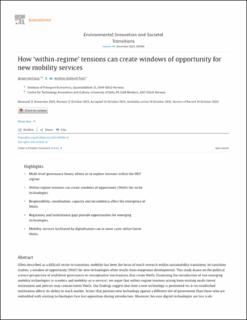| dc.contributor.author | Aarhaug, Jørgen | |
| dc.contributor.author | Tveit, Andreas Kokkvoll | |
| dc.coverage.spatial | Norway, Oslo | en_US |
| dc.date.accessioned | 2024-01-30T13:45:07Z | |
| dc.date.available | 2024-01-30T13:45:07Z | |
| dc.date.created | 2023-10-20T09:30:06Z | |
| dc.date.issued | 2023-10-19 | |
| dc.identifier.citation | Environmental Innovation and Societal Transitions. 2023, 49 (December 2023), 1-15. | en_US |
| dc.identifier.issn | 2210-4224 | |
| dc.identifier.uri | https://hdl.handle.net/11250/3114533 | |
| dc.description | Jørgen Aarhaug, Andreas Kokkvoll Tveit, How ‘within-regime’ tensions can create windows of opportunity for new mobility services, Environmental Innovation and Societal Transitions, Volume 49, 2023, 100784, ISSN 2210-4224, https://doi.org/10.1016/j.eist.2023.100784. | en_US |
| dc.description.abstract | Often described as a difficult sector to transition, mobility has been the focus of much research within sustainability transitions. In transition studies, a window of opportunity (WoO) for new technologies often results from exogenous developments. This study draws on the political science perspective of multilevel governance to conceptualise mechanisms that create WoOs. Examining the introduction of two emerging mobility technologies (e-scooters and mobility-as-a-service), we argue that within-regime tensions arising from existing multi-tiered institutions and policies may contain latent WoOs. Our findings suggest that how a new technology is positioned vis-à-vis established institutions affects its ability to reach market. Actors that position new technology against a different tier of government than those who are embedded with existing technologies face less opposition during introduction. Moreover, because digital technologies are less scale dependant, such technologies may allow actors more freedom concerning how they position their service in relation to the established institutions. | en_US |
| dc.description.abstract | How ‘within-regime’ tensions can create windows of opportunity for new mobility services | en_US |
| dc.language.iso | eng | en_US |
| dc.publisher | Elsevier B.V. | en_US |
| dc.rights | Navngivelse 4.0 Internasjonal | * |
| dc.rights.uri | http://creativecommons.org/licenses/by/4.0/deed.no | * |
| dc.subject | Multilevel perspective | en_US |
| dc.subject | Multilevel governance | en_US |
| dc.subject | Windows of opportunity | en_US |
| dc.subject | E-scooters | en_US |
| dc.subject | Mobility as a service | en_US |
| dc.subject | Technological transition | en_US |
| dc.title | How ‘within-regime’ tensions can create windows of opportunity for new mobility services | en_US |
| dc.title.alternative | How ‘within-regime’ tensions can create windows of opportunity for new mobility services | en_US |
| dc.type | Journal article | en_US |
| dc.type | Peer reviewed | en_US |
| dc.rights.holder | © 2023 The Author(s) | en_US |
| dc.source.articlenumber | 100784 | en_US |
| dc.description.version | publishedVersion | en_US |
| cristin.ispublished | true | |
| cristin.fulltext | original | |
| cristin.qualitycode | 2 | |
| dc.identifier.doi | 10.1016/j.eist.2023.100784 | |
| dc.identifier.cristin | 2186611 | |
| dc.source.journal | Environmental Innovation and Societal Transitions | en_US |
| dc.source.volume | 49 | en_US |
| dc.source.issue | December 2023 | en_US |
| dc.source.pagenumber | 1-15 | en_US |
| dc.relation.project | Norges forskningsråd: 283331 | en_US |
| dc.relation.project | Norges forskningsråd: 283327 | en_US |
| dc.relation.project | Norges forskningsråd: 316579 | en_US |

